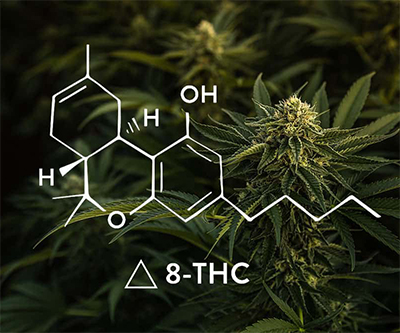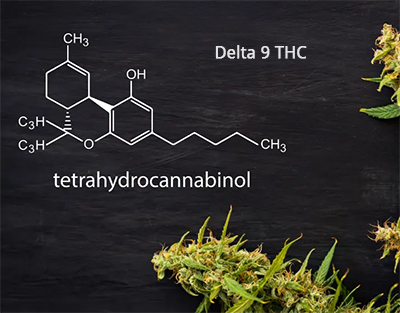In recent years, the conversation surrounding cannabinoids has expanded beyond just the well-known Delta-9 tetrahydrocannabinol (THC) to include its cousin, Delta-8 THC. As interest in cannabis compounds grows, so does the curiosity about their effects, legality, and potential benefits. This article aims to delve into the similarities, differences, and implications of Delta-8 THC compared to its more famous counterpart, Delta-9 THC.
Understanding Delta-8 THC
 Delta-8 THC is a lesser-known cannabinoid found in cannabis and hemp plants. It’s chemically similar to Delta-9 THC, sharing the same molecular formula: C21H30O2. However, their structural differences lead to varied effects on the body and mind. Delta-8 THC occurs in much smaller concentrations naturally, making it less abundant and harder to extract.
Delta-8 THC is a lesser-known cannabinoid found in cannabis and hemp plants. It’s chemically similar to Delta-9 THC, sharing the same molecular formula: C21H30O2. However, their structural differences lead to varied effects on the body and mind. Delta-8 THC occurs in much smaller concentrations naturally, making it less abundant and harder to extract.
Delta-9 THC
The Familiar Compound: Delta-9 THC is the primary psychoactive compound in cannabis, responsible for the “high” associated with marijuana use. It interacts with the body’s endocannabinoid system, specifically binding to CB1 receptors in the brain and nervous system. This interaction produces various effects, including euphoria, relaxation, altered perception of time, and increased appetite.
Distinguishing Characteristics
While both Delta-8 and Delta-9 THC share similarities in their chemical structures, their slight variances lead to notable differences in effects and legality.
Psychoactive Potency
Delta-9 THC is renowned for its potent psychoactive effects, often inducing strong euphoria and intoxication. In contrast, Delta-8 THC is reported to offer a milder high, with users describing it as more clear-headed and less anxiety-inducing than Delta-9 THC. This reduced potency makes Delta-8 THC potentially appealing to those seeking the therapeutic benefits of THC without the intensity of Delta-9.
Legality
The legal status of Delta-8 THC is a subject of debate and confusion. While Delta-9 THC remains illegal at the federal level in many countries, including the United States (but thankfully not Canada), the legal status of Delta-8 THC is less clear. Some argue that Delta-8 THC derived from hemp, containing less than 0.3% Delta-9 THC, falls under the legal loophole created by the 2018 Farm Bill. However, regulatory agencies like the Drug Enforcement Administration (DEA) have issued statements indicating their stance against the production and sale of Delta-8 THC, especially when synthesized from CBD isolate.
Therapeutic Potential
Both Delta-8 and Delta-9 THC exhibit potential therapeutic benefits, although research into Delta-8 THC is still in its infancy. Some studies suggest that Delta-8 THC may offer antiemetic, anxiolytic, and analgesic properties similar to Delta-9 THC but with fewer adverse effects. Additionally, anecdotal evidence indicates that Delta-8 THC may be particularly effective in managing nausea and vomiting, making it potentially valuable for individuals undergoing chemotherapy or experiencing gastrointestinal issues.
Implications and Considerations
The emergence of Delta-8 THC raises several important considerations for consumers, regulators, and researchers alike.
Safety and Regulation
As with any cannabinoid product, safety and regulation are paramount. The lack of comprehensive regulation surrounding Delta-8 THC raises concerns about product quality, purity, and accurate labeling. Without standardized testing and oversight, consumers may be at risk of exposure to harmful contaminants or misleading product claims.
Legal Clarity
The legal ambiguity surrounding Delta-8 THC complicates matters for both businesses and consumers. Clarity regarding its legal status at the federal and state levels is essential to avoid potential legal consequences and ensure compliance with existing regulations.
Research and Education
Further research into the pharmacology, safety profile, and therapeutic potential of Delta-8 THC is imperative. Robust clinical studies are needed to validate anecdotal reports and elucidate the compound’s mechanisms of action. Additionally, public education efforts can help consumers make informed decisions about Delta-8 THC products and understand their potential risks and benefits.
Conclusion
Delta-8 THC represents a fascinating addition to the ever-expanding landscape of cannabinoids, offering a unique balance of psychoactive effects and therapeutic potential. While similarities exist between Delta-8 and Delta-9 THC, their differences in potency, legality, and effects underscore the need for further research, regulation, and education. As interest in cannabinoid-based therapies continues to grow, a nuanced understanding of these compounds is essential for maximizing their benefits while minimizing potential risks.


